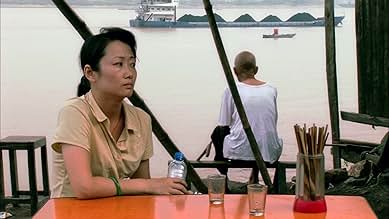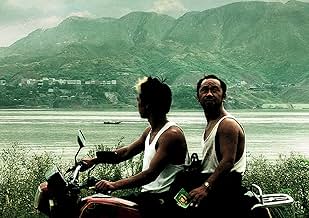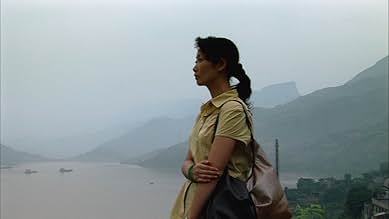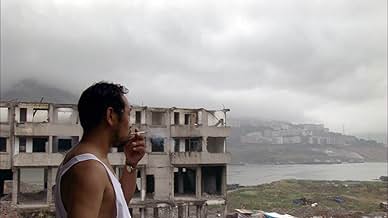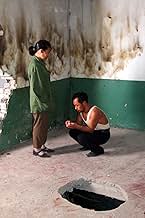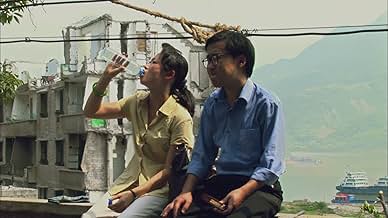IMDb RATING
7.3/10
7.7K
YOUR RATING
A town in Fengjie county is gradually being demolished and flooded to make way for the Three Gorges Dam. A man and woman visit the town to locate their estranged spouses, and become witness ... Read allA town in Fengjie county is gradually being demolished and flooded to make way for the Three Gorges Dam. A man and woman visit the town to locate their estranged spouses, and become witness to the societal changes.A town in Fengjie county is gradually being demolished and flooded to make way for the Three Gorges Dam. A man and woman visit the town to locate their estranged spouses, and become witness to the societal changes.
- Awards
- 15 wins & 14 nominations total
- Director
- Writers
- All cast & crew
- Production, box office & more at IMDbPro
Featured reviews
The comment which was written before mine gives a great and brilliant explanation of the social problems and facts that involves this film, so I am not going to repeat it. I prefer to talk about another one of the most relevant aspects of this movie: the photography, magisterially directed by Yu Likwai. Sometimes one can have the impression to be watching a photo album, further than a movie. There are no bad or ugly photo-grams in this film. Every image contains a really fine sense of photography as an art, including superb landscapes, exiting colors, and intelligent compositions with everything and everybody in the right place, without unaesthetic gaps. A pleasure for eyes and soul.
10enzino-1
Known previously as a documentary, and not as a romance, "Sanxia Haoren" ("Still Life") was the surprise and last film in Venice Festival (Italy) and not even the first one film of the young maker (he already had another movie in competition). Mr Jia shows us China just as it is nowadays. Not the power of huge works, or the beautiful scenery, just as the Dam on the Yangsi River nearby, but simple Chinese people, with simple problems, that do not know nothing such happiness (yet). It's heartbreaking, it's wonderfully filmed, it's like a superb painting. A simple masterpiece (and not only a Golden Lion). The surprise at Venice's Mostra. Catherine Deneuve, the French president of the jury of Venice, was very moved by Jia's work, the story told and the emotion of that film.
I've seen lots of presentations by businesspeople and academics about Chinese industry, development, social problems, politics, progress, environmental disasters, etc. etc. I've never seen anything like this. It's China on the ground - actually a town about to be submerged by the Three Gorgest Dam project. The title translation of "Three Gorges Good People" is right - these are ordinary folks who endure, persist, help each other out, etc. in a mixed landscape of natural beauty, building, poverty, and destruction that has to be seen to be understood. The story of the dam shapes everybody's life without actually determining or washing them out. Definitely try to see this if you have any interest at all in China today.
This week China announced that about 300,000 more people than planned will be relocated as a result of the construction of the Three Gorges Dam on the Yangtze River, bringing the total displaced to more than 1.4 million. The $22.5-billion US dam, a mega-project five times the size of the Hoover Dam, which has been heavily criticized by environmental and human rights groups, was begun in 1993 but will not go into full operation until 2008. The project's effect on ordinary Chinese is the focus of Jia Zhangke's latest film, Still Life, the surprise winner of the Golden Lion Award at this year's Venice Film Festival.
Set in the village of Fengjie, since submerged in water to make way for the dam, Jia's slow-paced, class-conscious effort dramatizes the life of villagers who have been forced from their homes, had their traditional way of life destroyed, and sent to live in cities against their will, often having to resort to begging and garbage collecting, or even prostitution to stay alive. The film, along with its companion documentary Dong, tells overlapping stories of the emotional trauma of local people caught in the dislocation at Fengjie while a new village is being built.
In the first sequence, Han Sanming, a middle-aged coal miner from Jia's home Shanxi province, arrives on a ferry to look for his ex-wife, Missy after sixteen years of estrangement. All he has to rely on is an address given to him many years ago, completely unaware of the demolition and flooding in the area. Avoiding local swindlers, he tracks down Missy's uncle who tells him that his former wife is now in Yichang with his teenage daughter. Staying on to work in the demolition projects, Han engages in conversations with other workers who complain of the low wages they are receiving (60 to 70 Yuan a day) and want to return to Shanxi province with Han where they can earn 200 Yuan a day working in the dangerous coal mines.
In the second story, Shen Hong (Zhao Tao), a nurse arrives from Shanxi as well and is also searching for a missing person, her husband Guo Bin, who left the family two years ago. She is aided in her search by archaeologist Wang Dongming but it is uncertain what course of action Shen has in mind when she reunites with her husband. The film, however, is not about the story line but about the landscape and the atmosphere, playfully charged by the CG appearance of a UFO and a spaceship that takes off in the middle of the rubble.
In Still Life, Jia demonstrates to the world how one of China's most gorgeous areas, one that brings in 1.3 million tourists a year, has become a scene of squalor. Jia says: "We all know there is major change going on in China and I wanted to get more people to know what's happening. I will continue to make films along these lines and explore the problems of the weaker social classes." If Jia's future projects contain the unmatched cinematography, compelling story, and characters whose lives touch us as Still Life, we have much to look forward to.
Set in the village of Fengjie, since submerged in water to make way for the dam, Jia's slow-paced, class-conscious effort dramatizes the life of villagers who have been forced from their homes, had their traditional way of life destroyed, and sent to live in cities against their will, often having to resort to begging and garbage collecting, or even prostitution to stay alive. The film, along with its companion documentary Dong, tells overlapping stories of the emotional trauma of local people caught in the dislocation at Fengjie while a new village is being built.
In the first sequence, Han Sanming, a middle-aged coal miner from Jia's home Shanxi province, arrives on a ferry to look for his ex-wife, Missy after sixteen years of estrangement. All he has to rely on is an address given to him many years ago, completely unaware of the demolition and flooding in the area. Avoiding local swindlers, he tracks down Missy's uncle who tells him that his former wife is now in Yichang with his teenage daughter. Staying on to work in the demolition projects, Han engages in conversations with other workers who complain of the low wages they are receiving (60 to 70 Yuan a day) and want to return to Shanxi province with Han where they can earn 200 Yuan a day working in the dangerous coal mines.
In the second story, Shen Hong (Zhao Tao), a nurse arrives from Shanxi as well and is also searching for a missing person, her husband Guo Bin, who left the family two years ago. She is aided in her search by archaeologist Wang Dongming but it is uncertain what course of action Shen has in mind when she reunites with her husband. The film, however, is not about the story line but about the landscape and the atmosphere, playfully charged by the CG appearance of a UFO and a spaceship that takes off in the middle of the rubble.
In Still Life, Jia demonstrates to the world how one of China's most gorgeous areas, one that brings in 1.3 million tourists a year, has become a scene of squalor. Jia says: "We all know there is major change going on in China and I wanted to get more people to know what's happening. I will continue to make films along these lines and explore the problems of the weaker social classes." If Jia's future projects contain the unmatched cinematography, compelling story, and characters whose lives touch us as Still Life, we have much to look forward to.
Still Life touches upon all the problems surrounding the controversial issue of the construction of the Three Gorges Dam but it only presents short glimpses of this reality, like colorful splashes of paint onto a palette: we see the young sixteen year old begging the outsider to take her away and find a job for her as a maid in a big city, panels indicating the phases of demolition, the word "demolition" painted outside people's residences, workers pulling down constructions, land compensation, relocation and myriads of hints at the inside stories of the people: helplessness, cynicism, acceptance, nostalgia.
The plot is very simple: a coal miner coming to the Three Gorges in search of his wife, whom he hasn't seen in sixteen years and a woman in search of her husband, whom she hasn't seen in three years. The human stories, set against the background of the Three Gorges and the Yangtze River, are fleeting, fragile, ethereal. The characters' journey is both physical and psychological. They both have traveled from Shanxi province in search of their wife and husband but their journey is also a journey into consciousness, nostalgia, loss and the past. Besides, it is also a crucial step before a new future. Along with the nostalgia and the lingering on what is lost, there is also a constant need to make decisions and move on, which is what the characters do. We, spectators, follow the characters at the same time as we/they make a journey into the Three Gorges. The connection between the characters and the landscape is obvious. The journey is not only into the characters' past but also a hint at the past of the Three Gorges, at all the villages which have been pulled down and at those who are about to disappear. The sense of loss in the characters' lives is unmistakably connected to the Three Gorges, to that which is already lost and to what is about to be taken away.
The film is definitely a beautiful and poetic reflection on time. The coal miner, Han Sanming, keeps the address of his former wife written on an old pack of cigarettes. When a young boy asks him what they are, he replies that they used to be the best brand of cigarettes sixteen years ago. The boy says he is too nostalgic, and to this, Han Sanming answers gravely that "we all remember our pasts". Yet Still Life is not only about time lost. There are also celebrations of the present. Han Sanming's determination to try again with his ex-wife is a note of optimism and hope. Various scenes in the film also show villagers dancing, enjoying a singing performance, where the camera lingers on their expressions of joy and enthusiasm, a clear celebration of life.
All the films I've seen about the Three Gorges and the Dam share a strong emphasis on the visual, arguably because the gripping power of the landscape cannot make it otherwise. Still Life is not an exception. One of its signs of distinction, which greatly accounts for the beauty of the film, is the way in which it is shot. The motion of the camera is always very slow and contemplative. It moves along the river banks as well as along objects and characters' faces in a fashion similar to that of a ship moving along the river. This slow, balanced, contemplative motion also recalls the movement of water, and brings to the viewer notions of fluidity, transformation and renewal. The background of the Three Gorges and the Yangzte is always there. Many takes show the contrast of the characters' insignificance against the overwhelming vastness of the landscape, and this is also done with objects. As Han Sanming contemplates a 10 Yuan note, the close take of the note is again set against the background of the Gorges. To all this must be added the attention to detail: the humanity of people's conversations, the taste of local Sichuan people, the colors, the contrasts. To me, Still Life is not only a cinematographic accomplishment. It is also evidence that people still remember, at this very important moment in time, the Three Gorges and its people.
The plot is very simple: a coal miner coming to the Three Gorges in search of his wife, whom he hasn't seen in sixteen years and a woman in search of her husband, whom she hasn't seen in three years. The human stories, set against the background of the Three Gorges and the Yangtze River, are fleeting, fragile, ethereal. The characters' journey is both physical and psychological. They both have traveled from Shanxi province in search of their wife and husband but their journey is also a journey into consciousness, nostalgia, loss and the past. Besides, it is also a crucial step before a new future. Along with the nostalgia and the lingering on what is lost, there is also a constant need to make decisions and move on, which is what the characters do. We, spectators, follow the characters at the same time as we/they make a journey into the Three Gorges. The connection between the characters and the landscape is obvious. The journey is not only into the characters' past but also a hint at the past of the Three Gorges, at all the villages which have been pulled down and at those who are about to disappear. The sense of loss in the characters' lives is unmistakably connected to the Three Gorges, to that which is already lost and to what is about to be taken away.
The film is definitely a beautiful and poetic reflection on time. The coal miner, Han Sanming, keeps the address of his former wife written on an old pack of cigarettes. When a young boy asks him what they are, he replies that they used to be the best brand of cigarettes sixteen years ago. The boy says he is too nostalgic, and to this, Han Sanming answers gravely that "we all remember our pasts". Yet Still Life is not only about time lost. There are also celebrations of the present. Han Sanming's determination to try again with his ex-wife is a note of optimism and hope. Various scenes in the film also show villagers dancing, enjoying a singing performance, where the camera lingers on their expressions of joy and enthusiasm, a clear celebration of life.
All the films I've seen about the Three Gorges and the Dam share a strong emphasis on the visual, arguably because the gripping power of the landscape cannot make it otherwise. Still Life is not an exception. One of its signs of distinction, which greatly accounts for the beauty of the film, is the way in which it is shot. The motion of the camera is always very slow and contemplative. It moves along the river banks as well as along objects and characters' faces in a fashion similar to that of a ship moving along the river. This slow, balanced, contemplative motion also recalls the movement of water, and brings to the viewer notions of fluidity, transformation and renewal. The background of the Three Gorges and the Yangzte is always there. Many takes show the contrast of the characters' insignificance against the overwhelming vastness of the landscape, and this is also done with objects. As Han Sanming contemplates a 10 Yuan note, the close take of the note is again set against the background of the Gorges. To all this must be added the attention to detail: the humanity of people's conversations, the taste of local Sichuan people, the colors, the contrasts. To me, Still Life is not only a cinematographic accomplishment. It is also evidence that people still remember, at this very important moment in time, the Three Gorges and its people.
Did you know
- TriviaRanked second in French film magazine Cahiers du cinéma's top 10 list of the best pictures of 2007, tied with Inland Empire (2006) and Boulevard de la mort (2007).
- ConnectionsFeatures Le syndicat du crime (1986)
- How long is Still Life?Powered by Alexa
Details
Box office
- Budget
- CN¥10,000,000 (estimated)
- Gross US & Canada
- $76,983
- Opening weekend US & Canada
- $12,744
- Jan 20, 2008
- Gross worldwide
- $2,504,465
- Runtime1 hour 51 minutes
- Color
- Sound mix
- Aspect ratio
- 1.78 : 1
Contribute to this page
Suggest an edit or add missing content




